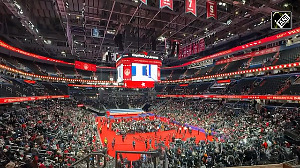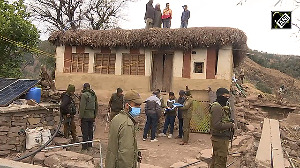 India's natural gas deficit and its reliance on imports will continue as the just announced gas pricing policy with its low rates and lack of roadmap to free pricing may not revitalise near stagnant exploration and production, a research report said on Thursday.
India's natural gas deficit and its reliance on imports will continue as the just announced gas pricing policy with its low rates and lack of roadmap to free pricing may not revitalise near stagnant exploration and production, a research report said on Thursday.
Existing gas discoveries in deepsea areas of Bay of Bengal are not viable at the new gas price of $5.61 per million British thermal unit, which is just 33 per cent higher than old rate of $4.2, it added.
"The new gas pricing policy is unlikely to revitalise Indian exploration and production," Kuala Lumpur-based CIMB Group said in its report on India's oil and gas scenario.
Besides raising price of gas from existing fields, the government on October 18 announced that a yet-to-be-determined premium will be paid for new discoveries in deepwater and difficult projects.
"The exclusion of existing deepwater fields from premium pricing may hamper the production prospects of some key Krishna Godavari basin blocks.
"The lack of a roadmap to free gas pricing, possibility of internal rate of return-based application of pricing premium and Government of India's differentiation between reasonable and windfall profits (perhaps erroneous) may fail to boost exploration," it said.
Stating that existing deepwater gas discoveries, mostly in the KG basin, are not viable at the new gas price of $5.61, CIMB Group said, "the denial of premium pricing to the existing discovered fields may have rendered the development of these fields uncertain."
In the past, the absence of commercially viable gas prices had not only discouraged high-risk new exploration activity but also hindered the development of some of the existing discoveries, such as the satellite fields in the Reliance Industries' eastern offshore KG-D6 block.
"Building a 3 per cent natural decline rate to the existing production of 88 million standard cubic meters per day, we estimate that India's total gas production, including the new gas discoveries, can reach about 154-155 mmscmd by 2020-21 -- still unlikely to surpass the previous peak of 155 mmscmd achieved in March 2010," CIMB said.
It said its ‘study indicates that India's gas deficit is unlikely to improve over the next 5-6 years implying that reliance on (imported) liquefied natural gas (LNG) is unlikely to abate.’
In the nine New Exploration Licensing Policy rounds since 1999, 131 discoveries have been reported in 41 blocks, 86 (2/3rd) of which are gas discoveries that will require higher gas prices and greater scale of operations to be viable, it said.
CIMB said 15 years since the launch of the NELP, under which 254 blocks or areas were awarded to firms like Reliance Industries Limited and Oil and Natural Gas Corporation for exploring and producing oil and gas, just one block is materially producing and only 9 others have substantial production prospects.
As many as 133 blocks have already been relinquished.
"While NELP started on a positive note with three big discoveries in the very first round, things have since dried up," it said, adding that block data suggests India's geology is at best moderate, if not poor.
"That said, India’s rather indifferent policy environment has compounded the geological problems and driven away both global and Indian private players.
"The lack of marketing freedom (especially for gas), excessive government oversight, bureaucratic delays and government's focus on its revenue maximisation at the cost of exploration maximisation are the key reasons behind the modest returns from NELP," it said.
Besides low formulaic gas pricing ($5.6) and lack of roadmap to free pricing in the new policy, government's failure to recognise high failure rates in E&P in assessing ‘reasonable profits’ may fail to boost exploration, the report added.











 © 2025
© 2025